What is Economics in Your Travel?
Toastmaster Meeting at PayPal Shanghai - Speech script prepared by Akira Kondo
October 14, 2014

At 7:00pm on October 14, I was in one of the rooms on the 22nd floor, where PayPal Shanghai occupied, and I was ready for delivering my speech, “What is economics in your travel?” Before stepping onto the stage, what I was only thinking of was how to make audience laugh every three minute out of a 30-minute speech.
Why did I have to make them laugh frequently during my speech? That was Toastmaster, where motivated people, like today’s audience, were here to learn, to practice, and to experience the wonderful form of communication, the speech.
“Thank you very much for having me here on this podium and I am more than excited to join you this Toastmaster meeting tonight!”
“When I first heard of Toastmaster meeting, I honestly thought of a kind of a cooking class, like how to toast a piece of bread, for someone like me, who is not good at cooking at all.”
“However it wasn't. It was a place, where motivated people, like you, were here to learn, practice, and experience the wonderful form of communication, the speech. I am glad to be here today to deliver my speech, rather than showing you off my poor cooking skills.”
Let’s begin my Toastmaster!
Humor is somewhat an important part of the speech. Without it, the speech is just turning out to be boring. Especially, talking about something educational topic, such as economics, philosophy, or mathematics, makes the audience quickly fallen into asleep with or without a cup of coffee.
A 30-minute speech is long if without fun, but it can be short with lots of fun. I took the latter because I myself wanted to enjoy my speech with my wonderful audience in this Toastmater meeting.
My next step to make the audience fun was to introduce myself by assuming we were now at the People’s Square on the weekend.
Why did I have to make them laugh frequently during my speech? That was Toastmaster, where motivated people, like today’s audience, were here to learn, to practice, and to experience the wonderful form of communication, the speech.
“Thank you very much for having me here on this podium and I am more than excited to join you this Toastmaster meeting tonight!”
“When I first heard of Toastmaster meeting, I honestly thought of a kind of a cooking class, like how to toast a piece of bread, for someone like me, who is not good at cooking at all.”
“However it wasn't. It was a place, where motivated people, like you, were here to learn, practice, and experience the wonderful form of communication, the speech. I am glad to be here today to deliver my speech, rather than showing you off my poor cooking skills.”
Let’s begin my Toastmaster!
Humor is somewhat an important part of the speech. Without it, the speech is just turning out to be boring. Especially, talking about something educational topic, such as economics, philosophy, or mathematics, makes the audience quickly fallen into asleep with or without a cup of coffee.
A 30-minute speech is long if without fun, but it can be short with lots of fun. I took the latter because I myself wanted to enjoy my speech with my wonderful audience in this Toastmater meeting.
My next step to make the audience fun was to introduce myself by assuming we were now at the People’s Square on the weekend.
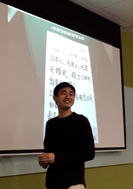
“My name is Akira Kondo. I am Japanese, 32 years old, still single, no home, no marriage experience yet…”
With my personal information on the screen right behind me, I believed that it was one of the ways to show myself, as a still-single mid-30 man, to beautiful and handsome audience right in front of me.
Five days ago, I was working on my speech script. The time was clearly limited, which made me nervous to think of the topic. I needed to talk about something I was very familiar with, such as “economics” and “travel” from my experience. These were two of my favorite interests in my life. Soon I came up with a simple question, “what is economics in your travel?”
Next up, I explained how important the travel is. Coming down to PayPal office was somewhat unique to me. One of my last corporate trips was Space X in Los Angeles a couple of years ago. Both PayPal and Space X were founded by a young American entrepreneur, Elon Musk. He is also a founder of Tesla Motor.
With my personal information on the screen right behind me, I believed that it was one of the ways to show myself, as a still-single mid-30 man, to beautiful and handsome audience right in front of me.
Five days ago, I was working on my speech script. The time was clearly limited, which made me nervous to think of the topic. I needed to talk about something I was very familiar with, such as “economics” and “travel” from my experience. These were two of my favorite interests in my life. Soon I came up with a simple question, “what is economics in your travel?”
Next up, I explained how important the travel is. Coming down to PayPal office was somewhat unique to me. One of my last corporate trips was Space X in Los Angeles a couple of years ago. Both PayPal and Space X were founded by a young American entrepreneur, Elon Musk. He is also a founder of Tesla Motor.
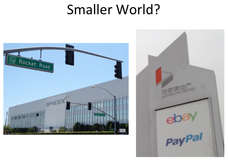
“It is kind of an interesting intention for me to deliver a speech here… Somewhat I am here today from Space X to PayPal. Don't you think the world is getting smaller and smaller?”
To explain how small the world it is, I added my travel experience of this year-to-date.
“This year so far, I have flown nearly 100 times across the globe. I don't know 100 flights a year are a lot or not because my friends fly even more. One thing I know is that people need to travel more thanks to today’s global economy.”
“Yes, everyone now faces a global economy that economies are interacted with each other from one place to another. People’s mobility is getting intense. In this global economy, you need to travel and you will have to know what the counterparts are, such as people, cultures, foods, and importantly economies.”
Slowly I wanted to attract my audience into the subject of economics, which people tended to get bored when once hearing the word, “economics.” The word, “economics,” was the hardest part for me to make it visualized for my audience. I had to assume the audience had not attended any economics courses before, and I had tried to come up with a good idea very carefully.
Although I did not want to talk about the definition of the economics, I had to do so by adding one slide of the definition of it in sentences. It was the only way for me to connect the economics to how important economics in your travel was.
To explain how small the world it is, I added my travel experience of this year-to-date.
“This year so far, I have flown nearly 100 times across the globe. I don't know 100 flights a year are a lot or not because my friends fly even more. One thing I know is that people need to travel more thanks to today’s global economy.”
“Yes, everyone now faces a global economy that economies are interacted with each other from one place to another. People’s mobility is getting intense. In this global economy, you need to travel and you will have to know what the counterparts are, such as people, cultures, foods, and importantly economies.”
Slowly I wanted to attract my audience into the subject of economics, which people tended to get bored when once hearing the word, “economics.” The word, “economics,” was the hardest part for me to make it visualized for my audience. I had to assume the audience had not attended any economics courses before, and I had tried to come up with a good idea very carefully.
Although I did not want to talk about the definition of the economics, I had to do so by adding one slide of the definition of it in sentences. It was the only way for me to connect the economics to how important economics in your travel was.
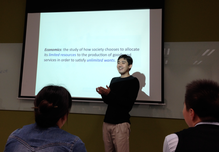 Akira Kondo at PayPal Shanghai
Akira Kondo at PayPal Shanghai
“Economics, not economy, is a study of science. By definition, Economics is the study of how society chooses to allocate its scarce resources (in the slide, I used the word, “limited,” to make the definition simple) to the production of goods and services in order to satisfy your unlimited wants.”
It was the most boring part of the speech and my only hope at that time that the audience did not fall into asleep. Soon I came up with a fun idea to make them awake.
“We always have unlimited wants, you want to buy Green Tea Frappuccino (GTF) at Starbucks store everyday, you want to buy a new iPhone 6, and you want to buy a handsome boyfriend or a beautiful girlfriend. These are your wants.
“But you have a limited resource*, money in your wallet. This is the middle of October right after the National Day holiday and you start to think of how you can survive till the next payday. How much Mao Zhedong do you have in your wallet today? Do you start to miss his face in your wallet?”
*the resources in economics term are actually labor, land, and technology. They are the inputs that produce goods and services.
My next step is to connect this economics with the travel.
“Today, you will see how economies are globalized and complicated and how the economy interacts with your travel experiences.”
Travel was back and I started off the nearer trip to WuJiaoChang (WJC) with the economics in your travel.
“I believe many of you here have traveled at least once this year, whether it is a leisure or a business trip. Some of you are maybe not from Shanghai. To meet your parents, you need to travel back by some modes of transportations, such as train, bus, car, or airplane.”
“Some of you may have traveled to overseas for a business meeting… Either way, it is still a travel. Even you make a trip to WJC by Line 2 & 10 from here, it is still a travel.”
It was the most boring part of the speech and my only hope at that time that the audience did not fall into asleep. Soon I came up with a fun idea to make them awake.
“We always have unlimited wants, you want to buy Green Tea Frappuccino (GTF) at Starbucks store everyday, you want to buy a new iPhone 6, and you want to buy a handsome boyfriend or a beautiful girlfriend. These are your wants.
“But you have a limited resource*, money in your wallet. This is the middle of October right after the National Day holiday and you start to think of how you can survive till the next payday. How much Mao Zhedong do you have in your wallet today? Do you start to miss his face in your wallet?”
*the resources in economics term are actually labor, land, and technology. They are the inputs that produce goods and services.
My next step is to connect this economics with the travel.
“Today, you will see how economies are globalized and complicated and how the economy interacts with your travel experiences.”
Travel was back and I started off the nearer trip to WuJiaoChang (WJC) with the economics in your travel.
“I believe many of you here have traveled at least once this year, whether it is a leisure or a business trip. Some of you are maybe not from Shanghai. To meet your parents, you need to travel back by some modes of transportations, such as train, bus, car, or airplane.”
“Some of you may have traveled to overseas for a business meeting… Either way, it is still a travel. Even you make a trip to WJC by Line 2 & 10 from here, it is still a travel.”
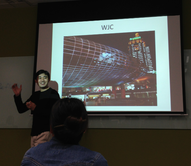
“Have you ever been to WJC recently?”
“It’s a whole different place than you expect. There are 5 Starbucks stores within a half-kilometer distance from central WJC, Hyatt hotel is going to open in coming years, and XiaoYang fried dumpling is there as well.”
Starbucks was one of the candidates to be in my speech. Throughout the speech from this point, I used one of Starbucks customers’ all time favorites, Green Tea Frappuccino, as an example to deal with the “economics in your travels.”
“Who would have expected there were five Starbucks stores in WJC? Unless you traveled there, you never knew it.”
In China, consuming a Starbucks drink is not for everyone’s daily activity, rather upper-income people can enjoy with the drink frequently.
“Generally, you will find out that people who grab coffee at Starbucks tend to be upper-income people. Starbucks’ customers all time favorite is probably GTF. In China, it costs 30RMB for the tall size. Not really cheap, is it?”
“If you go to Starbucks stores at ifc mall or Shanghai World Financial Center in LuJiaZui (LJZ), you may realize Starbucks customers dress well and they are mostly regular returning customers.”
And mentioning that the audience was Starbucks’ targeted customers.
“We all here are also located in a part of LJZ district, where upper-income people live. There are 2 Starbucks stores available around here? We all must be Starbucks’ targets. Starbucks always keeps eyeing on you, who are capable of buying their products!”
“Can you afford Starbucks drinks? Sure you can, but the question comes how many Starbucks drinks can you afford every month.”
“If you can get GTF every day, that’s probably you make more income than the others. 30RMB multiply by 30 days of a month, you will spend 900RMB per month for your Green Tea Frappuccino.”
After talking about familiar Starbucks drinks, now it was the time once again to talk about economics. Economics is a study of science. Without showing data, economics cannot be explained.
“I’m not asking how much you earn, but I can assume how much average Chinese people earn per month or per year and also relative to the others.”
Explaining economic data would not be fun but interestingly, the audience was very motivated to learn about what today’s Chinese economy looked like.
“It’s a whole different place than you expect. There are 5 Starbucks stores within a half-kilometer distance from central WJC, Hyatt hotel is going to open in coming years, and XiaoYang fried dumpling is there as well.”
Starbucks was one of the candidates to be in my speech. Throughout the speech from this point, I used one of Starbucks customers’ all time favorites, Green Tea Frappuccino, as an example to deal with the “economics in your travels.”
“Who would have expected there were five Starbucks stores in WJC? Unless you traveled there, you never knew it.”
In China, consuming a Starbucks drink is not for everyone’s daily activity, rather upper-income people can enjoy with the drink frequently.
“Generally, you will find out that people who grab coffee at Starbucks tend to be upper-income people. Starbucks’ customers all time favorite is probably GTF. In China, it costs 30RMB for the tall size. Not really cheap, is it?”
“If you go to Starbucks stores at ifc mall or Shanghai World Financial Center in LuJiaZui (LJZ), you may realize Starbucks customers dress well and they are mostly regular returning customers.”
And mentioning that the audience was Starbucks’ targeted customers.
“We all here are also located in a part of LJZ district, where upper-income people live. There are 2 Starbucks stores available around here? We all must be Starbucks’ targets. Starbucks always keeps eyeing on you, who are capable of buying their products!”
“Can you afford Starbucks drinks? Sure you can, but the question comes how many Starbucks drinks can you afford every month.”
“If you can get GTF every day, that’s probably you make more income than the others. 30RMB multiply by 30 days of a month, you will spend 900RMB per month for your Green Tea Frappuccino.”
After talking about familiar Starbucks drinks, now it was the time once again to talk about economics. Economics is a study of science. Without showing data, economics cannot be explained.
“I’m not asking how much you earn, but I can assume how much average Chinese people earn per month or per year and also relative to the others.”
Explaining economic data would not be fun but interestingly, the audience was very motivated to learn about what today’s Chinese economy looked like.
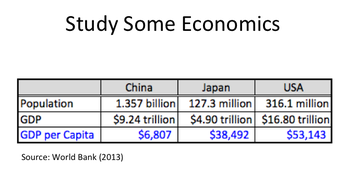
“This is typical GDP data that economists as well as ordinal people, like us, can find out on most newspapers. GDP stands for Gross Domestic Product. It is an income for all the Chinese, who live in the mainland.”
“For instance, all the Chinese together earned US$9.24 trillion in 2013. If you divide that number by the population in China, 1.3 billion, you get an income per each Chinese person (US$9.24 trillion / 1.357 billion).” On average, an each Chinese earn US$6,800 or about 42,000RMB annually. Or average the average Chinese can consume 1,400 cups of GTF per year.”
Then, I went more details about the income and explained how unique to know about the Chinese income.
“For instance, all the Chinese together earned US$9.24 trillion in 2013. If you divide that number by the population in China, 1.3 billion, you get an income per each Chinese person (US$9.24 trillion / 1.357 billion).” On average, an each Chinese earn US$6,800 or about 42,000RMB annually. Or average the average Chinese can consume 1,400 cups of GTF per year.”
Then, I went more details about the income and explained how unique to know about the Chinese income.
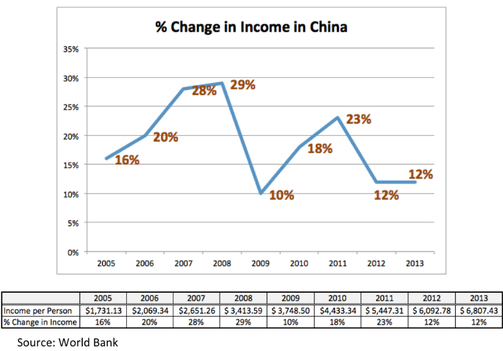
“Over the past 10 years, the Chinese income grew rapidly. Before the global financial crisis, your income grew over 20 percent annually. In a past couple of years, your income still grew more than 10 percent.”
“For instance, the average Chinese income grew 12 percent last year. That being said, your income also should have grown about 12 percent last year.”
By using this graph, I used the Rule of 72 to explain how long it would take for them to double their incomes. The Rule of 72 is simple, but sophisticated, and is probably the best source to fit into this speech thanks to its simplicity.
“Here is the interest rule about doubling your income. The Rule of 72 tells you how many years it will take your income to get doubled. It is very simple to calculate. You will just divide the magic number 72 by the growth rate of your income.”
“For instance, look back at this past 10-year Chinese income growth again. In the beginning of 2009, which is the end of the 2008 income, the income stands at about US$3,400. Over the past five years, the Chinese income grew 10% in 2009, 18%, 23%, 12%, and 12% in 2013. If you add up those annual growth rates, you will get 75. Then divide that 75 by five years. You will get the average annual income growth rate of 15%.”
“Get back to the Rule of 72. You put that 15% into the denominator of the equation, meaning 72 divided by the average annual income growth rate, 15%. Now you get 4.8, meaning 4.8 years to get your income doubled.”
“Look back the graph again, the beginning of 2009, which is the end of 2008, is US$3,413 and the 2013 income is US$6,807. Isn’t that about five years to get the income doubled, is it?”
“For instance, the average Chinese income grew 12 percent last year. That being said, your income also should have grown about 12 percent last year.”
By using this graph, I used the Rule of 72 to explain how long it would take for them to double their incomes. The Rule of 72 is simple, but sophisticated, and is probably the best source to fit into this speech thanks to its simplicity.
“Here is the interest rule about doubling your income. The Rule of 72 tells you how many years it will take your income to get doubled. It is very simple to calculate. You will just divide the magic number 72 by the growth rate of your income.”
“For instance, look back at this past 10-year Chinese income growth again. In the beginning of 2009, which is the end of the 2008 income, the income stands at about US$3,400. Over the past five years, the Chinese income grew 10% in 2009, 18%, 23%, 12%, and 12% in 2013. If you add up those annual growth rates, you will get 75. Then divide that 75 by five years. You will get the average annual income growth rate of 15%.”
“Get back to the Rule of 72. You put that 15% into the denominator of the equation, meaning 72 divided by the average annual income growth rate, 15%. Now you get 4.8, meaning 4.8 years to get your income doubled.”
“Look back the graph again, the beginning of 2009, which is the end of 2008, is US$3,413 and the 2013 income is US$6,807. Isn’t that about five years to get the income doubled, is it?”
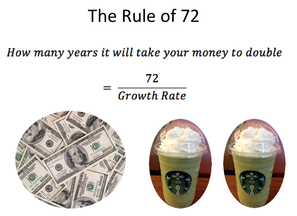
“The Rule of 72 works for this case, and it is very simple to estimate. If you know that your income will grow 15 percent annually for next five years, your today’s income should get doubled by the end of 2018.”
Thanks to my nervousness during the speech, I forgot to mention about your doubling income. I wanted to add the following paragraph in the speech:
“If your salary did not get doubled over the past five years, you should talk to your manager. You should argue, “how come my income did not get doubled over the past five years while the other Chinese’s income got doubled?”
“Unfortunately, in the real world, cost of Starbucks drinks will also increase while your salary is growing. It is because of inflation. However, you feel safe as long as your income grows faster than the growth rate of the price of Starbucks drinks. In that way, you can get more Green Tea Frappuccino in the future than you do today.”
“That being said, you should look for the growth rate of your salary every year, not the amount you get. Your salary growth is far more important than how much you make.”
“Please know that studying economics is all about science. Economists as well as investors are always looking for the rate of change, a growth rate.”
Although the audience might have thought how come I was talking about the Chinese economy, rather than the other countries, my mission was to make the speech as simple as possible. Chinese economy was the one that today’s audience were most familiar with. Plus, I wanted them to understand how a foreigner, like me, was looking at today’s Chinese economy. On the other hand, I wanted the audience to analyze the difference between the Chinese economy and the others, especially before they were traveling out next time.
“Wherever you travel, places like Starbucks, McDonald’s, and KFC, are somewhat a safe heaven. You don't much worry about getting their products at Starbucks or McDonald’s overseas because you know the products at home and they sell exactly the same products.”
“When you step into a Starbucks store in San Francisco and look for GTF on the menu board, you will first realize the price in dollars, not RMB. Then you pull out your iPhone from your pocket, you hit the calculator to translate the dollar into RMB. Next you say, cheap!”
Thanks to my nervousness during the speech, I forgot to mention about your doubling income. I wanted to add the following paragraph in the speech:
“If your salary did not get doubled over the past five years, you should talk to your manager. You should argue, “how come my income did not get doubled over the past five years while the other Chinese’s income got doubled?”
“Unfortunately, in the real world, cost of Starbucks drinks will also increase while your salary is growing. It is because of inflation. However, you feel safe as long as your income grows faster than the growth rate of the price of Starbucks drinks. In that way, you can get more Green Tea Frappuccino in the future than you do today.”
“That being said, you should look for the growth rate of your salary every year, not the amount you get. Your salary growth is far more important than how much you make.”
“Please know that studying economics is all about science. Economists as well as investors are always looking for the rate of change, a growth rate.”
Although the audience might have thought how come I was talking about the Chinese economy, rather than the other countries, my mission was to make the speech as simple as possible. Chinese economy was the one that today’s audience were most familiar with. Plus, I wanted them to understand how a foreigner, like me, was looking at today’s Chinese economy. On the other hand, I wanted the audience to analyze the difference between the Chinese economy and the others, especially before they were traveling out next time.
“Wherever you travel, places like Starbucks, McDonald’s, and KFC, are somewhat a safe heaven. You don't much worry about getting their products at Starbucks or McDonald’s overseas because you know the products at home and they sell exactly the same products.”
“When you step into a Starbucks store in San Francisco and look for GTF on the menu board, you will first realize the price in dollars, not RMB. Then you pull out your iPhone from your pocket, you hit the calculator to translate the dollar into RMB. Next you say, cheap!”
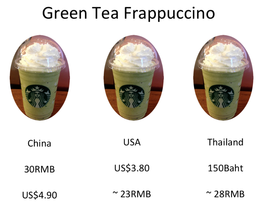 Prices as of the mid-2014
Prices as of the mid-2014
“Prices of Starbucks products are much cheaper than those in China. How come? Because they are the American products and Starbucks sell the right price to the right customers. What you want to know about Starbucks USA is that it is the base price, which we can use as a comparable measurement.”
“Back to Shanghai, our price of GTF is 30RMB. If we translate that US$3.80 into RMB term, it’s going to be about 23RMB based on today’s exchange rate. Now compare to GTF in San Francisco, we are paying about 7RMB more than Americans pay across the Pacific Ocean.”
“Are we rich? Maybe because Starbucks set the price like that way that we are paying for more expensive Starbucks drinks here. Or the company thinks the Chinese customers tend to occupy the tables for many hours and Starbucks wants to charge the tables. If not, maybe it’s just a cost of doing business in China.”
“How about Thailand?” Thai are also paying higher for getting Starbucks drinks but still a few RMB cheaper than China.”
“However, this is all about a price comparison between China and the U.S. or Thailand. Let see how many GTF can we drink per year based on our income? Our average annual income is about $6,800 in US dollar term or 42,000RMB, so we can drink as much as 1,400 GTFs per year. Or you need to spend 26% of your annual income to enjoy Starbucks everyday.”
“Is that enough GTF to you? How about Americans? Americans’ annual income is $53,000, about 8 times higher. That means Americans can enjoy GTF 10 times more than you can enjoy per year. That is probably the reason Americans are chubbier, is that right? Or Americans spend only 2% of annual income to enjoy Starbucks everyday.”
Income levels are different among different countries. However, the important part is the growth rate of your incomes, which translate into your standard of livings. That is economists always keep eyeing on. You always want to focus on your standard of living. By doing so, your chance to enjoy GTF should be higher.
“When you travel overseas or even to WJC, there are always different economies. Starbucks was just a part of an example that I wanted to show. I don't think your parents did enjoy Starbucks as much as you do today or Starbucks were not available at that time nearby they lived.”
“You had never stepped into a Starbucks store when you were a high school or a college student. Probably you had thought who would have paid for a 30RMB drink.”
“Back to Shanghai, our price of GTF is 30RMB. If we translate that US$3.80 into RMB term, it’s going to be about 23RMB based on today’s exchange rate. Now compare to GTF in San Francisco, we are paying about 7RMB more than Americans pay across the Pacific Ocean.”
“Are we rich? Maybe because Starbucks set the price like that way that we are paying for more expensive Starbucks drinks here. Or the company thinks the Chinese customers tend to occupy the tables for many hours and Starbucks wants to charge the tables. If not, maybe it’s just a cost of doing business in China.”
“How about Thailand?” Thai are also paying higher for getting Starbucks drinks but still a few RMB cheaper than China.”
“However, this is all about a price comparison between China and the U.S. or Thailand. Let see how many GTF can we drink per year based on our income? Our average annual income is about $6,800 in US dollar term or 42,000RMB, so we can drink as much as 1,400 GTFs per year. Or you need to spend 26% of your annual income to enjoy Starbucks everyday.”
“Is that enough GTF to you? How about Americans? Americans’ annual income is $53,000, about 8 times higher. That means Americans can enjoy GTF 10 times more than you can enjoy per year. That is probably the reason Americans are chubbier, is that right? Or Americans spend only 2% of annual income to enjoy Starbucks everyday.”
Income levels are different among different countries. However, the important part is the growth rate of your incomes, which translate into your standard of livings. That is economists always keep eyeing on. You always want to focus on your standard of living. By doing so, your chance to enjoy GTF should be higher.
“When you travel overseas or even to WJC, there are always different economies. Starbucks was just a part of an example that I wanted to show. I don't think your parents did enjoy Starbucks as much as you do today or Starbucks were not available at that time nearby they lived.”
“You had never stepped into a Starbucks store when you were a high school or a college student. Probably you had thought who would have paid for a 30RMB drink.”
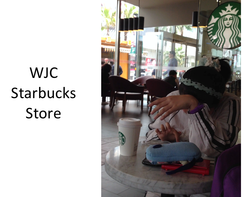
“A couple of days ago, I went to a WJC Starbucks store. I saw a junior high school girl enjoying her Starbucks drink while she was studying. Actually, she was playing game on her iPhone. That’s not matter but what I want to mention is that some of today’s young kids can enjoy Starbucks while you didn't when you were a kid.”
“This is one of the scenes that China’s economy is growing and their incomes are growing as well. That is what I have been observing for years and interested in. In the very near future, your kids are next going to enjoy Starbucks in their childhood.”
“It was just a small trip to WJC for me but I have found different economies from here or Japan. I believe you will have more travels to enjoy from now on thanks to this global economy and I hope you will find the different economies in your next travel experiences.”
I was supposed to finish up my speech here; however, the Toastmaster organizer generously offered me an additional five-minute speech duration. Thus, I have added a few more slides about economics in your travels and no more Starbucks!
“This is one of the scenes that China’s economy is growing and their incomes are growing as well. That is what I have been observing for years and interested in. In the very near future, your kids are next going to enjoy Starbucks in their childhood.”
“It was just a small trip to WJC for me but I have found different economies from here or Japan. I believe you will have more travels to enjoy from now on thanks to this global economy and I hope you will find the different economies in your next travel experiences.”
I was supposed to finish up my speech here; however, the Toastmaster organizer generously offered me an additional five-minute speech duration. Thus, I have added a few more slides about economics in your travels and no more Starbucks!
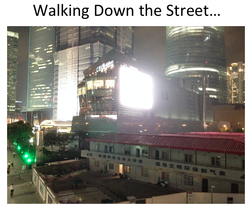
“Do you know where it is?”
“It is not a pretty photo, is it? I know if you were me, you would have shot higher that whole three buildings were in a picture. Why did I take a photo like that? Because I am more interested in the down than the up.”
“High-rise buildings that are being constructed are probably serving for richer companies and wealthier global business travelers. How about people who are constructing those buildings? Are they wealthy? How much do they earn?”
“Can these ground workers’ incomes eventually catch up with the income earned by people who work in the high-rise building in the future? Probably not.
“There are two different economies between the upper side and the ground. That is my another story of economics in my travel when I walked that place last night.”
“It is not a pretty photo, is it? I know if you were me, you would have shot higher that whole three buildings were in a picture. Why did I take a photo like that? Because I am more interested in the down than the up.”
“High-rise buildings that are being constructed are probably serving for richer companies and wealthier global business travelers. How about people who are constructing those buildings? Are they wealthy? How much do they earn?”
“Can these ground workers’ incomes eventually catch up with the income earned by people who work in the high-rise building in the future? Probably not.
“There are two different economies between the upper side and the ground. That is my another story of economics in my travel when I walked that place last night.”
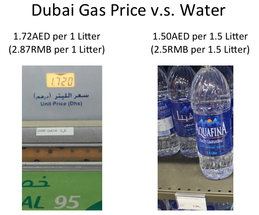
“Next up, I have found out that Dubai gas price is cheaper than a bottle of water when I traveled Dubai earlier this year. Today’s gas price is high across the globe. I don't know how much the gas in China is but I guess it is not cheap.”
“It is again a different economy. When you travel out, you will always find different economies. Not only taking cute photos of yourself, try take some photos around you in your next travel.”
“Economies are everywhere and economies always interact with your travel experience. Now, everyone has smartphones and can take photos anytime anywhere.”
“It is again a different economy. When you travel out, you will always find different economies. Not only taking cute photos of yourself, try take some photos around you in your next travel.”
“Economies are everywhere and economies always interact with your travel experience. Now, everyone has smartphones and can take photos anytime anywhere.”
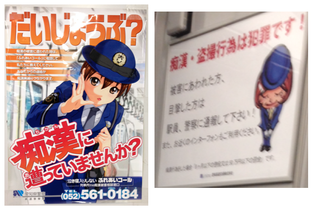
“However, be very careful when you take photos when you travel overseas. Some people in some countries hate to be taken photos. In Japan, if you take a photo of a schoolgirl right in front of you on an escalator, the chance you will get arrested is higher.”
“Hope you enjoy finding some different economies in your next travel and thank you for having me here this evening.”
Once my speech ended, I realized it went faster than I planned. It was probably because I skipped some parts after thinking too much of how to make it fun during the speech. When I first thought of this speech, the humor was my top priority so that secondly I could make my audience easily understood about the economics.
I believe my audience has understood my findings about economics in travels but in any cases if they did not understand, I left my speech script on this page. Honestly, I wanted to share more about economics in travels but I hope to show you more about it if there is any chance in the future.
Specially, I thank to Stephanie Xiao, who has generously invited me on the stage, as well as the members of Toastmaster. Plus, I really enjoyed the speech delivered by a young talented man from eBay, Eric Diao. I believe all the people in today’s Toastmaster meeting are going to be the next global business leaders. If you do become, please do not forget me!
“Hope you enjoy finding some different economies in your next travel and thank you for having me here this evening.”
Once my speech ended, I realized it went faster than I planned. It was probably because I skipped some parts after thinking too much of how to make it fun during the speech. When I first thought of this speech, the humor was my top priority so that secondly I could make my audience easily understood about the economics.
I believe my audience has understood my findings about economics in travels but in any cases if they did not understand, I left my speech script on this page. Honestly, I wanted to share more about economics in travels but I hope to show you more about it if there is any chance in the future.
Specially, I thank to Stephanie Xiao, who has generously invited me on the stage, as well as the members of Toastmaster. Plus, I really enjoyed the speech delivered by a young talented man from eBay, Eric Diao. I believe all the people in today’s Toastmaster meeting are going to be the next global business leaders. If you do become, please do not forget me!
